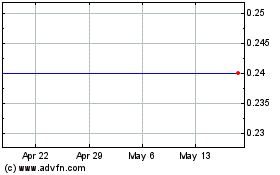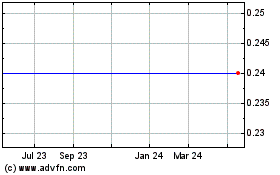Alpha Cognition Inc. (TSX-V: ACOG)(OTCQB: ACOGF)(“Alpha
Cognition”, or the “Company”), a biopharmaceutical company
committed to developing novel therapies with the potential to
transform the lives of people with debilitating neurodegenerative
disorders, today announced the formation of a Scientific Advisory
Board (SAB) comprised of industry leaders in neurology and
psychiatry, chaired by James E. Galvin, MD, MPH. The SAB will work
cohesively with management to advance the company’s clinical
development pipeline and to develop highly differentiated products
to treat neurological diseases with significant unmet needs.
“I’m delighted to serve as Chair of Alpha Cognition’s Scientific
Advisory Board, and to be part of such a distinguished group of
industry experts,” said James E. Galvin, MD, MPH. “Collectively we
will aim to guide Alpha Cognition through the development of its
current pipeline and to provide the team at Alpha Cognition with
real world perspective on the needs of healthcare providers,
patients and caregivers.”
“The prestigious group of scientific thought leaders we have
assembled to sit on our Scientific Advisory Board will provide
Alpha Cognition with relevant expertise as we further the
development of our clinical pipeline and get closer to
commercialization,” said Michael McFadden, CEO of Alpha Cognition.
“Each member brings unique experience from early-stage research to
the late-stage clinical development in neurology. I believe this
collection of brilliant minds and experience will serve us well as
we develop assets in neurology, with a focus on our lead
development candidate, ALPHA-1062.”
The founding members of the Alpha Cognition Scientific Advisory
Board are:
Frank Conidi, DO, MS, FAAN, FAHS is a Boston trained
Board Certified sports neurologist/headache specialist. He is the
Director of the Florida Center for Headache and Sports Neurology, a
tertiary center dedicated to the treatment of patients with
chronic/refractory headache disorders and sports related concussion
and sports related neurological disorders. He is a nationally
recognized expert on sports concussion and the team neurologist for
the NHL’s Florida Panthers and has served as a consulting
neurologist for the NFL, USTA, NCAA and MLB players.
Jeffrey Cummings, MD, ScD is Vice Chair of Research and
Professor, UNLV Department of Brain Health. Dr. Cummings directs
the Chambers-Grundy Center for Transformative Neuroscience at UNLV.
He is Founding Director of the UCLA Alzheimer’s Disease Research
Center and of the Cleveland Clinic Lou Ruvo Center for Brain
Health. Dr. Cummings is a world-renowned Alzheimer’s researcher and
leader of clinical trials. He has been recognized for his research
and leadership contributions in the field of Alzheimer’s disease
and his interests embrace clinical trials, developing new therapies
for brain diseases, and the interface of neuroscience and society.
Dr. Cummings has published nearly 800 articles and 44 books devoted
to neuroscience, Alzheimer’s disease, and clinical trials.
James E. Galvin, MD, MPH is Professor of Neurology,
Psychiatry and Behavioral Sciences at the University of Miami
Miller School of Medicine and the founding Director of the
Comprehensive Center for Brain Health. A board-certified
neurologist, Dr. Galvin has authored over 300 scientific
publications, 25 book chapters, and three textbooks on healthy
brain aging, cognitive health, memory loss, Alzheimer’s disease,
Lewy body dementia, and related disorders. His research has focused
on developing novel tools for the detection, diagnosis and
characterization of cognitive impairment, testing novel
non-pharmacological, psychoeducational, and pharmacologic
interventions in improving patient- and caregiver-centered
outcomes. Dr. Galvin’s research has been funded by the National
Institutes of Health, Florida and New York Department of Health,
and numerous private and family foundations.
Elaine Peskind, MD is the Co-Director of the VA VISN 20
(Northwest Network) Mental Illness Research, Education, and
Clinical Center (MIRECC). She is also the Friends of Alzheimer’s
Research Professor of Psychiatry and Behavioral Sciences at the
University of Washington (UW) School of Medicine and Associate
Director of the UW Alzheimer’s Disease Research Center. Dr.
Peskind’s research over the past 30 years has addressed cognitive
and behavioral problems and cerebrospinal fluid (CSF) biomarkers in
neurodegenerative dementing disorders such as Alzheimer’s disease.
More recently, her research has focused on combat trauma
posttraumatic stress disorder and mild traumatic brain injury. She
conducts single site as well as multi-site large scale studies of
CSF biomarkers and pharmacological treatment trials for behavioral
disorders and traumatic brain injury.
Mary Sano, PhD is Professor of Psychiatry and the
Director of the Alzheimer's Disease Research at Mount Sinai School
of Medicine. Dr. Sano is a neuropsychologist by training and has
been involved in designing and conducting clinical trials for
Alzheimer's disease, Parkinson's disease, and mild cognitive
impairment of aging. In 2014 she received the Clinical Trials in
Alzheimer’s Disease (CTAD) Lifetime Achievement Award. Her research
interests are in clinical trial design and the impact of
pharmacological treatments on the functional abilities of
individuals with cognitive impairment.
Lon S. Schneider, MD, directs the USC State of California
Alzheimer’s Disease Center and the USC NIH Alzheimer’s Disease
Research Center clinical core. He served as a senior scientific
advisor at the NIMH and on the American Psychiatric Association
Committee for Practice Guidelines in Alzheimer’s and Other
Dementia. He holds a master’s degree in biometry and epidemiology
and has expertise in clinical trials methods and drug development.
His work involves treatment development with novel metabolic and
neuroregenerative compounds, outcomes assessment, and approaches to
modeling and clinical trials simulations.
Kristine Yaffe, MD, is a Professor of Psychiatry,
Neurology and Epidemiology, and the Scola Endowed Chair and Vice
Chair at UCSF. Dr. Yaffe is also the Chief of NeuroPsychiatry and
Director of the Memory Disorders Clinic at the San Francisco
Veteran’s Affairs Medical Center. Dr. Yaffe's research focuses on
the epidemiology of dementia and cognitive aging, and she is the
foremost leader in identifying modifiable risk factors for
dementia. Dr. Yaffe was the first to determine that potentially 30%
of dementia risk is preventable. With over 600 peer-reviewed
articles dedicated to improving population brain health
(H-index=148), she has received numerous awards for her
groundbreaking work including the Potamkin Prize for Alzheimer’s
Research and, in 2019, she was elected to the National Academy of
Medicine.
Investor Relations Agreements:
The company has engaged Bello Capital Partners (Bello) to
provide strategic digital media services to increase public
awareness of and interest in the company, its management, and its
securities by coordinating certain investor relations and corporate
financial public relations with members of the investment
community, the financial media and the public, in general. Under
the terms of the agreement, Bello will provide a combination of
content development, web development, media buying and
distribution, and campaign reporting at a total cost of $250,000
USD over an expected three-month period. Bello is arm's length to
the Company and does not currently own any securities of the
Company.
Additionally, the company has retained Integral Wealth
Securities Limited (“Integral”) as market-makers. In consideration
of the services provided by Integral, the Company will pay Integral
a monthly cash fee of $10,000. The Company has retained Integral
for an initial 3-month term. Integral will not receive shares or
options as compensation pursuant to the agreement. The Company and
Integral are unrelated and unaffiliated entities. When engaged by
the Company, neither Integral nor its principals held any direct or
indirect interest in Company securities.
About Alpha Cognition Inc.
Alpha Cognition Inc. is a clinical stage, biopharmaceutical
company dedicated to developing treatments for under-served
neurodegenerative diseases, such as Alzheimer's Dementia and
Amyotrophic Lateral Sclerosis (ALS).
ALPHA-1062, is a patented new chemical entity that has
demonstrated safety and improved tolerability in human clinical
trials. It is being developed as a new generation
acetylcholinesterase inhibitor for the treatment of Alzheimer's
disease, with minimal gastrointestinal side effects and novel
routes of administration. ALPHA-1062's active metabolites are
differentiated from donepezil and rivastigmine in that they may
sensitize neuronal nicotinic receptors, most notably the alpha-7
subtype, which is known to have a positive effect on cognition.
ALPHA-1062 is also being developed in combination with memantine to
treat moderate to severe Alzheimer's dementia and in a nasal spray
formulation to treat traumatic brain injury.
ALPHA-0602 (Progranulin) is expressed in several cell types in
the central nervous system and in peripheral tissues, regulates
cell survival and certain inflammatory processes, and plays a major
role in regulating lysosomal function and microglial responses to
disease. Its use for the treatment of neurodegenerative diseases
has been patented by the Company and granted an Orphan Drug
Designation.
Neither TSX Venture Exchange (the “TSX-V”), OTC Markets Group,
nor the TSX-V’s Regulation Services Provider (as that term is
defined in policies of the TSX-V) accepts responsibility for the
adequacy or accuracy of this release.
Forward-looking Statements
This news release is not, and under no circumstances is to be
construed as, an advertisement or a public offering of securities.
No securities commission or similar authority in Canada or in any
other jurisdiction has reviewed or in any way passed upon this news
release or the merits of the securities described herein and any
representation to the contrary is an offence.
This news release includes forward-looking statements within the
meaning of applicable securities laws. Except for statements of
historical fact, any information contained in this news release may
be a forward-looking statement that reflects the Company’s current
views about future events and are subject to known and unknown
risks, uncertainties, assumptions and other factors that may cause
the actual results, levels of activity, performance or achievements
to be materially different from the information expressed or
implied by these forward-looking statements. Forward-looking
statements can be identified by the words “may,” “might,” “will,”
“could,” “would,” “should,” “expect,” “intend,” “plan,”
“objective,” “anticipate,” “believe,” “estimate,” “predict,”
“project,” “potential,” “target,” “seek,” “contemplate,” “continue”
and “ongoing,” or the negative of these terms, or other comparable
terminology intended to identify statements about the future.
Forward-looking statements in this news release include statements
regarding the Company’s business strategy, market size, potential
growth opportunities, capital requirements, clinical development
activities, the timing and results of clinical trials, regulatory
submissions, potential regulatory approval and commercialization of
the technology. Although the Company believes that we have a
reasonable basis for each forward-looking statement, we caution you
that these statements are based on a combination of facts and
factors currently known by us and our expectations of the future,
about which we cannot be certain. The Company cannot assure that
the actual results will be consistent with these forward-looking
statements as a result of known and unknown risks, uncertainties,
assumptions and other factors. These risks, uncertainties,
assumptions and other factors include those associated with
clinical studies and manufacturing, as well as development and
commercialization of the Company’s products; the need for
additional financing to maintain operations; risks posed by the
economic and political environments in which the Company operates
and intends to operate; market instability due to the COVID-19
pandemic; the potential for losses arising from the expansion of
operations into new markets; increased competition; assumptions
regarding market trends and the expected demand and desires for the
Company’s products and proposed products; reliance on industry
manufacturers, suppliers and key personnel; the failure to
adequately protect intellectual property; a failure to adequately
manage future growth; adverse market conditions; and failure to
satisfy ongoing regulatory requirements or obtain regulatory
approvals. These forward-looking statements speak only as of the
date of this news release and, other than as required by applicable
securities laws, the Company undertakes no obligation to revise or
update any forward-looking statements, even if new information
becomes available in the future.
This news release may also contain estimates and other
statistical, market and industry data from independent parties or
made by the Company relating to our industry. This data involves a
number of assumptions and limitations, and you are cautioned not to
give undue weight to such estimates. We cannot guarantee the
accuracy and completeness of information from third party
sources.
View source
version on businesswire.com: https://www.businesswire.com/news/home/20211001005039/en/
Bristol Investor Relations Stefan Eftychiou 905 326 1888 ext 6
stefan@bristolir.com https://www.alphacognition.com/
Alpha Cognition (TSXV:ACOG)
Historical Stock Chart
From Dec 2024 to Jan 2025

Alpha Cognition (TSXV:ACOG)
Historical Stock Chart
From Jan 2024 to Jan 2025
